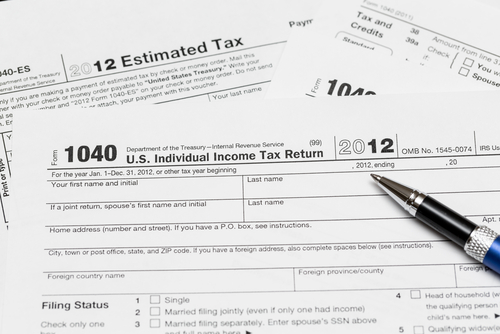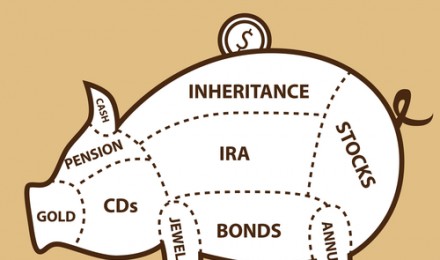Citizen or resident taxpayers can choose from three forms for filing individual federal income tax returns: Form 1040EZ, Form 1040A, and Form 1040 . Of the three forms, the easiest one to fill out is Form 1040EZ. However, you must determine if you meet the necessary conditions to use this form. In addition, before you make the decision to use form 1040 EZ, make sure that you will not receive greater benefit using form 1040 A or 1040 instead to claim a tax deduction or a larger EIC.
Here are the requirements to qualify to file your tax return using the form:
Filing Status
You can only use Form 1040EZ if you choose the filing status of single or married filing jointly. Single means you have never been married or you were legally separated based on state law under a decree of divorce or separate maintenance.
To qualify for married filing jointly, you must be married at the end of 2012, although you do not need to live with your spouse at the end of the tax year.
You cannot have any dependents. The standard tax deduction is automatically applied based on the filing status.
Income Limitation
You must have a taxable income of less than $100,000, whether you’re single or married filing jointly.
Income Sources
Rules also limit the taxable income you can report on Form 1040EZ to the following sources:
- Employment wages
- Tips
- Taxable scholarships
- Grants
- State unemployment compensation
- Alaska Permanent Fund
- Dividends
- Maximum $1,500 taxable interest
Other Qualifications
Taxpayers who are 65 and older or blind cannot use Form 1040EZ. In addition, to qualify to use this form, you cannot owe any household employment taxes on wages you paid to a household worker. If you are a debtor in a Chapter 11 bankruptcy case, which was filed after October 16, 2005, you cannot prepare your taxes on Form 1040EZ
If you cannot meet all the requirements for using this form, prepare your tax return on Form 1040 or Form 1040A, if you’re eligible.
Disadvantages of Using Form 1040EZ
Taxpayers considering using 1040EZ need to evaluate the pros and cons of filing taxes on the form. Failure to do so could result in you paying more income taxes than you are required to pay. For example, the form does not allow you to claim any tax deduction other than the standard deduction and personal exemptions.
Furthermore, the only credit you can claim on the form is the Earned Income Credit (EIC). You will not be able to claim common deductions and credits like mortgage interest education or education credits on your return.
Citizen or resident taxpayers can choose from three forms for filing individual federal income tax returns: Form 1040EZ, Form 1040A, and Form 1040 . Of the three forms, the easiest one to fill out is Form 1040EZ. However, you must determine if you meet the necessary conditions to use this form. In addition, before you make the decision to use form 1040 EZ, make sure that you will not receive greater benefit using form 1040 A or 1040 instead to claim a tax deduction or a larger EIC.
Here are the requirements to qualify to file your tax return using the form:
Filing Status
You can only use Form 1040EZ if you choose the filing status of single or married filing jointly. Single means you have never been married or you were legally separated based on state law under a decree of divorce or separate maintenance.
To qualify for married filing jointly, you must be married at the end of 2012, although you do not need to live with your spouse at the end of the tax year.
You cannot have any dependents. The standard tax deduction is automatically applied based on the filing status.
Income Limitation
You must have a taxable income of less than $100,000, whether you’re single or married filing jointly.
Income Sources
Rules also limit the taxable income you can report on Form 1040EZ to the following sources:
- Employment wages
- Tips
- Taxable scholarships
- Grants
- State unemployment compensation
- Alaska Permanent Fund
- Dividends
- Maximum $1,500 taxable interest
Other Qualifications
Taxpayers who are 65 and older or blind cannot use Form 1040EZ. In addition, to qualify to use this form, you cannot owe any household employment taxes on wages you paid to a household worker. If you are a debtor in a Chapter 11 bankruptcy case, which was filed after October 16, 2005, you cannot prepare your taxes on Form 1040EZ
If you cannot meet all the requirements for using this form, prepare your tax return on Form 1040 or Form 1040A, if you’re eligible.
Disadvantages of Using Form 1040EZ
Taxpayers considering using 1040EZ need to evaluate the pros and cons of filing taxes on the form. Failure to do so could result in you paying more income taxes than you are required to pay. For example, the form does not allow you to claim any tax deduction other than the standard deduction and personal exemptions.
Furthermore, the only credit you can claim on the form is the Earned Income Credit (EIC). You will not be able to claim common deductions and credits like mortgage interest education or education credits on your return.







